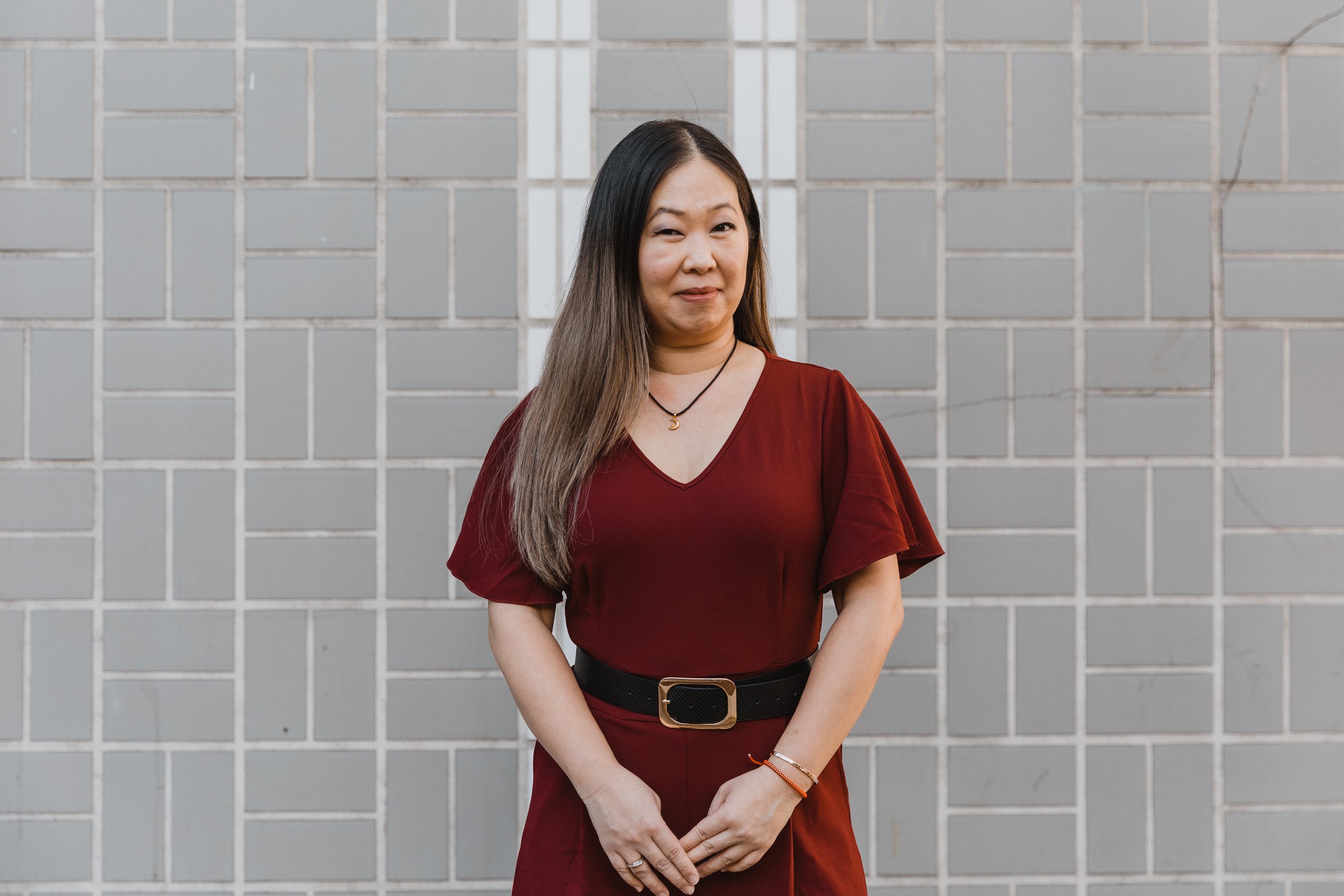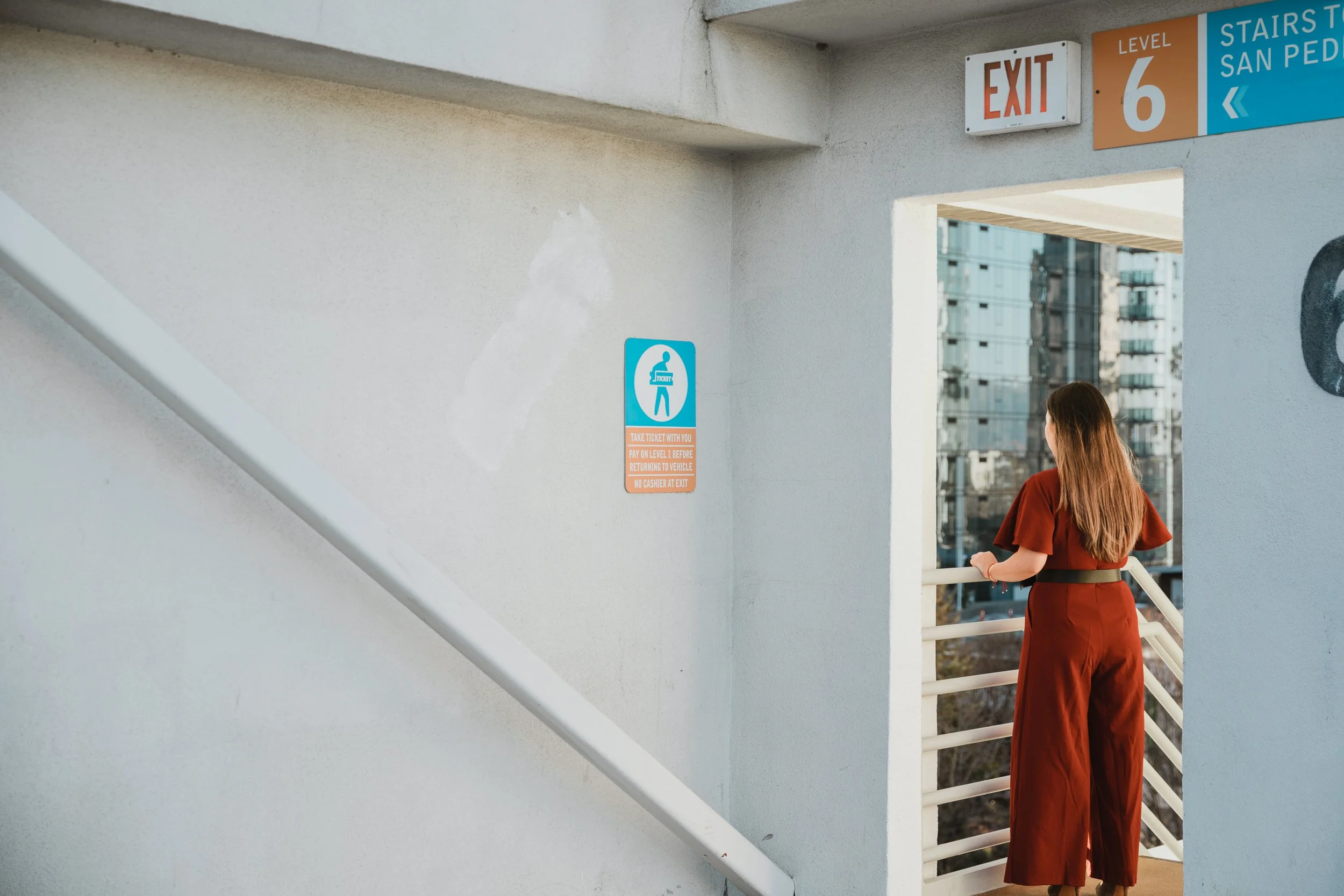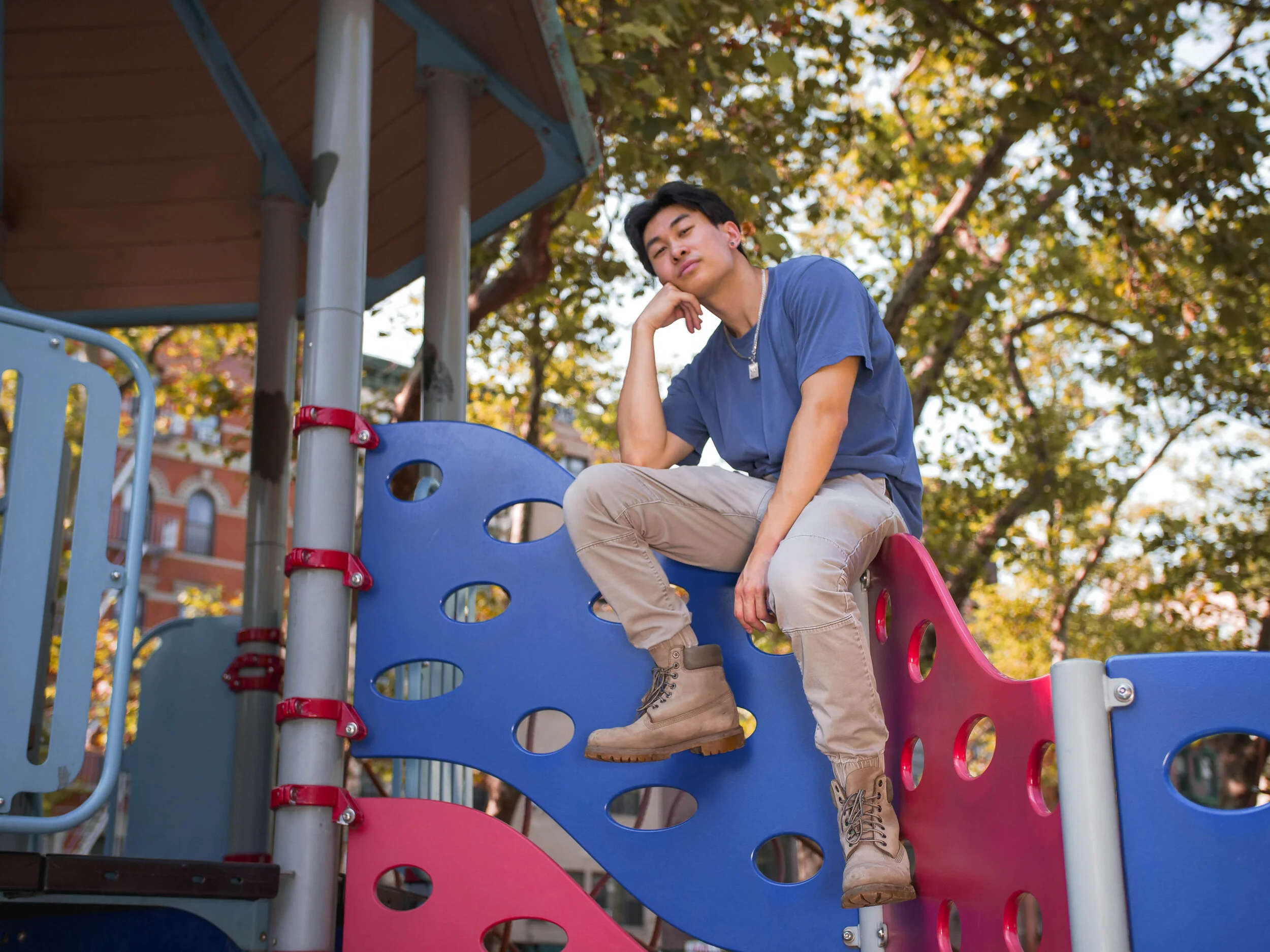Hard work & heart work
fearless leadership for raising our voices
HELEN MA
chinese american
Helen grew up knowing the perceptions of being an only child to a Chinese immigrant family. Not just an only child, but a daughter. There’s a perception that when you have a daughter, they are burdened, and that said daughter is not encouraged to grow up to have their own voice, opinion, or any ambition. For Helen, this was so far from the truth. Having lost her father at nine years old, Helen’s mother always encouraged and empowered her to run towards opportunities, be fearless, work hard, and to lead with heart. As Project by Project San Francisco’s Steering Committee President, Helen’s goal is to continue building inclusive and equitable environments and to bring people together to recognize the worth of each individual voice.
Q: What is the biggest misconception you would like to address about your cultural identity and/or Asian American identity?
A: There’s an overwhelming perception that Asians are a monolith. Asians can’t be leaders, or more specifically, Asian women can't be leaders. Growing up, I've always had a really strong figure in my mom, and she's always been someone who has told me to reach for the stars and pursue what I wanted. But when I look around and look at the media landscape for role models, there aren’t many Asian representatives in leadership roles. As I navigate my career path and exercise my ambitions with my personality, I want to be that Asian woman in power – that person in the office who assumes leadership roles, and be that leader for other Asian Americans.
“I want to be that Asian woman in power – that person in the office who assumes leadership roles, and be that leader for other Asian Americans.”
Q: Growing up, what type of Asian American representation was missing in the media landscape? How did that lack of representation reflect what you saw in the workplace?
A: I think it's a little bit of knowing how the community and the people around you speak about you versus how you're feeling. When you look at TV, movies, magazines, or even the books that you're reading, they don't often feature an Asian American story or an Asian-centric storytelling. I don't want to say I was always looking for those voices to influence the narrative of my story, but it is important to note it was not common to see those leaders or Asian voices around me.
When you are surrounded by friends who are mostly Asian growing up, you don’t realize that the world outside of your bubble does not look like you nor does it have people that look like you representing what’s best for you, your family, and your community. When you start to look at the data and statistics surrounding Asians in Leadership positions, you realize there aren’t many Asian American women in power. And when you hear stereotypes of Asians being too docile, quiet, or shy, or hear microaggressions from people who say, “You speak English so well,” you realize there is still a lot of work to be done.
I look back at the comments I heard from people in middle school. Teachers would say things like, “Oh, you speak very eloquently,” or “I didn't know that you could be so passionate about this subject,” or “You're not who I thought you would be.” It’s challenging to hear that what you're passionate about, or the things that matter to you, are very different from how other people perceive the Asian American community.
Q: How did these perceptions affect your overall upbringing?
A: My dad passed away when I was nine, so I was an only child raised by a single parent. When he passed, my mom fearlessly went after what she needed to provide for the two of us. Growing up in that type of environment made me understand the value of hard work.
When I think back to that time in my life, my mom really didn't know how to cook, but she learned. Now, everyone loves her food and I learned to cook at a really young age because of her. I love having that as part of my history. Now, I’m able to represent my community and my culture through food.
Seeing someone close to you in your life that works really hard to get everything that she deserves is inspiring to see. It's been empowering to see that even though she had suffered a huge loss, she was able to rebuild and came back stronger.
“Seeing someone close to you in your life that works really hard to get everything that she deserves is inspiring to see. It's been empowering to see that even though she had suffered a huge loss, she was able to rebuild and came back stronger.”
Q: What other pivotal life moments helped shape your identity? How did it shape your unique story and identity?
A: When I was in middle school, the Columbine High School shooting happened, and it was the first time in my life where I felt that I needed to step up and make change. I remember coming home from school and seeing 24/7 media coverage about the shooting. There were a bunch of interviews of students that survived. I saw this unfold as a seventh grader, and I didn’t understand how and why this was happening. But then I realized that this could happen anywhere, including my own school. There was a very big element of fear which came with that.
I was able to turn that fear to action by fundraising and asking schoolmates to commit to creating a better environment at school so that we were not the next school shooting. Leading that whole campaign, I realized the power I had to open up opportunities for people and help the community which was so heavily impacted by this shooting.
This led me to spend my teenage and early adult years involved in nonprofits and leadership roles at school, bringing representation, awareness, and funds to issues that impacted me and my community. I’ve been proud to have built a career and life focused on building inclusive and equitable work environments, giving back to communities that are often forgotten about, and amplifying my own culture and community. It’s important that I continue to build my career and endeavors in ways that promote diversity and bring people together.
Q: Do you think being a community advocate from such a young age allowed you to combat the perceptions of women in leadership and power?
A: One thing that was instilled in me at a young age was the pursuit of happiness. While many immigrant parents say, “You have to become a doctor or lawyer to make lots of money,” for my mom, it was, “Do whatever you're passionate about and whatever makes you happy.” It’s definitely a different way of thinking that I value.
With the Columbine High School shooting happened, I remember going home and telling my mom about it and her asking, “What are you going to do about it?” It forced me to take my hopelessness and turn it into something that is hopeful. Having someone like my mom to push me on those ideas to be like, “What is it that you see, what is it that you're experiencing, and what would you like to do about it?” was crucial. I think, in a way, she was very much an activist without even knowing it.
Q: Can you tell us more about how you navigated diversity and inclusion in your professional career, as well as in your side passion projects?
A: When I graduated college, I worked with former Alameda County Board of Supervisor, Alice Lai-Bitker. I was one of her part-time staff members, and at the time, she was the only Asian American woman on the Alameda County Board of Supervisors. I worked with her for about two years with a focus on providing social services to women and children. She had a huge Chinese constituent base who often didn’t have an advocate like Supervisor Lai-Bitker, so it was really rewarding being able to support her in bringing voice and resources to the community. From there, I launched myself into the nonprofit world where I partnered with schools to inspire and mentor kids on making a local and global difference in the world. Many of these schools were in low socioeconomic areas where kids were told their opportunities were limited. It was important to change that narrative and provide actionable ways for kids and schools to learn the power they had to make a difference in the world.
I am now a People Operations Director at a Sustainability Consulting Firm. As the person championing People Operations (HR) in a mission-driven, people-first organization like Stok, it is important to me that I build out opportunities to hire and support our sustainability initiatives as a company. Whether it's ensuring that we defy industry standards in who we hire, or bringing in speakers to discuss how social justice issues impact the built environment, or raising awareness and funds for social justice issues, I’m driving our culture to represent the equitable world we want to live in.
On the side, I’m a wedding planner and coordinator, working mostly with Asian American clients. I once had a girl tell me that they hadn’t seen Asian Americans in the wedding industry. This surprised me because the vendors I work with are often minority and Asian owned and operated businesses.
I realized that people make a lot of assumptions based on media and notable wedding magazines and editorials that don’t often feature people of color. In reality, and especially in California, Asian Americans are everywhere in the wedding industry. It has been a blessing to partner up with local Asian American wedding vendors and continue working with people who really understand the importance of Asian American cultures and traditions through weddings, such as tea ceremonies.
Q: Since the pandemic, hate crimes toward the Asian American community have risen tremendously. Reports from the Center for the Study of Hate and Extremism revealed that anti-Asian hate crime increased by 339 percent in 2021. How have those statistics and stories impacted you?
A: The increase of Asian Hate Crimes this past year has made so many of us feel helpless and at a loss for ourselves and our loved ones, myself included. It has been so hopeful to see so many organizations step up to raise awareness and funds for AAPI organizations and community initiatives. I have especially loved the opportunity to lead the San Francisco Chapter of Project by Project because we are giving our members an opportunity to build leadership skills by raising awareness and funds for social causes. So many of us are told that we don’t have the leadership skills in our day-to-day jobs and are seeking an opportunity to speak up, lead with confidence, and make a difference. Project by Project has given us the forum to safely do so.
Our community has banded together in an unprecedented way in the past year to amplify the lived AAPI experience – from holding rallies, to hosting virtual events, to starting organizations, to fundraising for AAPI organizations. We’ve learned that our words and actions can be amplified and that it can protect our community. Encouraging friends and the community to get involved and to understand the power of their individual voices has been the best way for me to feel hopeful about a better future. If we could help every person make sure their voice is heard, then why not push to achieve that.
“Encouraging friends and the community to get involved and to understand the power of their individual voices has been the best way for me to feel hopeful about a better future. If we could help every person make sure their voice is heard, then why not push to achieve that.”
Q: How did you get involved with Project by Project? What goals do you have for the organization in 2022?
A: I discovered the New York chapter of Project by Project while living in New York and looking for volunteer opportunities. They were looking for day-of volunteers for their annual Plate by Plate tasting event, and it sounded like a perfect opportunity to get involved with the New York community. It was really inspiring to see other Asian Americans working together for this philanthropic event.
When I relocated back to the Bay Area, I knew that I wanted to have a volunteer opportunity that was more consistent and would give me opportunities to pursue more leadership work. The 2020 theme surrounding civic engagement felt perfect given that it would be used as an opportunity to help increase voter engagement in the 2020 election. This was especially important with what the AAPI community was experiencing with the increase of xenophobia and anti-Asian hate crimes.
Project by Project will be celebrating its 25th Anniversary as a nationwide organization this year, so we’ll be revisiting the impact that we’ve made as an organization and in the AAPI community. Each year, Project by Project selects an annual campaign theme to raise and funds for. We’ve partnered with incredible nonprofit organizations to raise awareness and funds for a wide variety of social causes from housing and homelessness to mental health, and most recently, the environment. I find it incredibly pertinent that in 2022, we are able to remind everyone how these social causes impact our community while debunking the model minority myth. This year, our members will have the opportunity to learn about why we chose diverse social causes and organizations before being given the opportunity to volunteer and fundraise for these organizations.
As a part of our 25th anniversary celebration, we look forward to engaging our alumni this year to share about how the AAPI community has taken up space. We want to show our members the diverse ways we can lead both in our community and at work. As a 100% volunteer-led organization, our leadership team has also committed to building out a robust leadership and development program so that our volunteer Steering Committee can continue to build personal and professional skills.
Our annual Plate by Plate tasting event this fall will celebrate the continued resiliency of our community and the hospitality industry. In 2021, we hosted a sold out tasting event with over 500 guests, 100 volunteers, and 40 food and drink purveyors sampling their best dishes in support of Project by Project and our 2021 nonprofit partner, Florence Fang Community Farms.
Q: How has understanding your identity shaped where you are today in your advocacy for the AAPI community?
A: We all hold multiple identities, whether it's our gender, ethnicity, our relation to others, or what role we have at work. My life has always centered around recognizing issues that impacted me then finding ways to change the narrative or trajectory. My involvement with Project by Project has made me realize what it truly means to be Asian and American. Through our work as an organization, I’ve realized how so many resources are not given to the AAPI community and how critical it is to continue to raise awareness and funds for our community. I am not doing justice to the community or these causes if I stay silent and do nothing.











